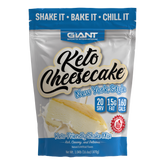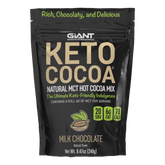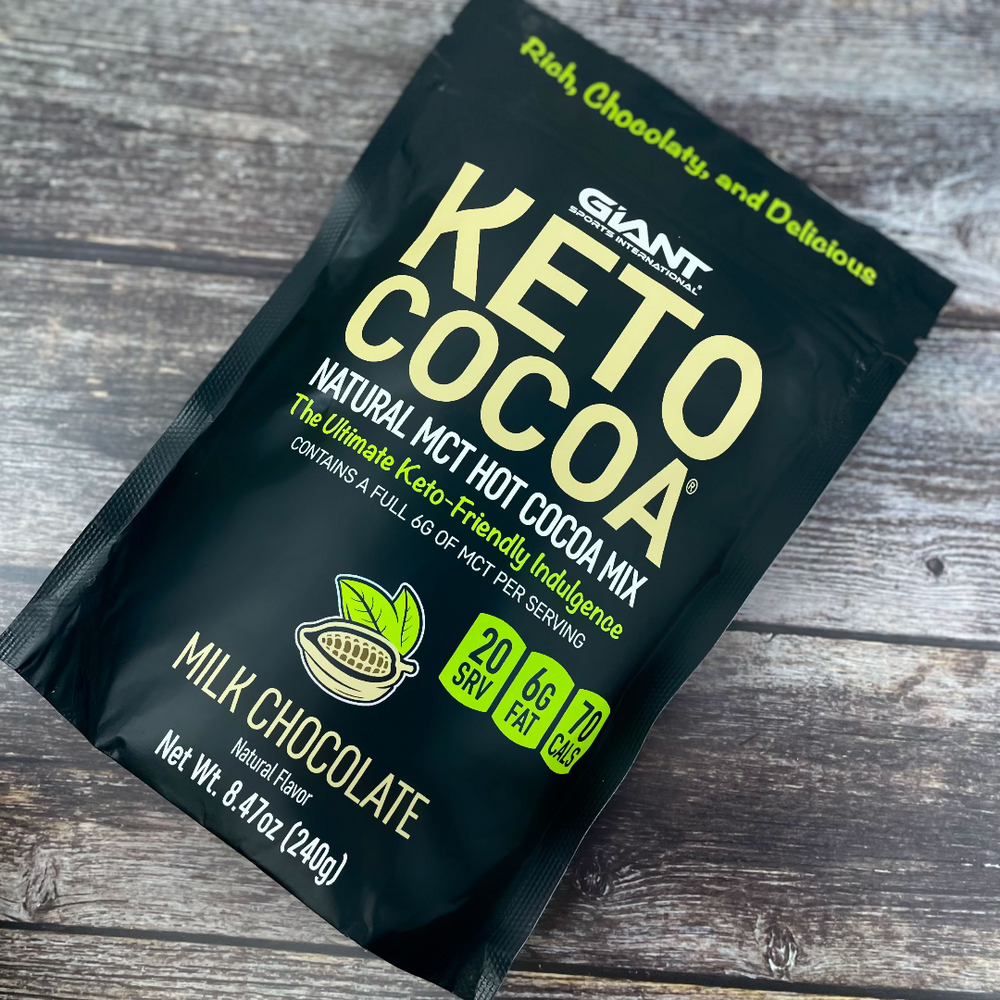Cornstarch Substitutes: Carbs in Cornstarch

What You'll learn...
- What Is a Thickening Agent?
- What is Cornstarch?
- The Best Low-Carb Cornstarch Substitutes
- Glucommanna Powglucomannander
- Xanthan Gum
- Almond Flour
- Cauliflower
- Chia Seeds
- Flaxseed
- Cornstarch Should Be Avoided on the Keto Diet
Cornstarch is a popular thickening agent for a lot of different meals. People use it in gravy, soup, and stew. You may want to prepare foods that call for cornstarch when you are on the keto diet but you will quickly discover that just one ounce has more than 25 grams of carbohydrates. This could put you over your carb count for the day, especially if you consider the other carbs that may be in the meal.
Fortunately, there are low-carb thickening agents that you can use as a substitute for cornstarch. They will do the same job with much fewer carbs. Read on to learn all about cornstarch and low-carb thickening agents that can take its place.
What Is a Thickening Agent?
A thickening agent can be added to prepared food to change its texture by making it thicker. You might add yogurt as a thickening agent in a smoothie. Another example is adding ice cream to make a milkshake. Cornstarch is frequently added to gravy, soups, or stews to give the thick, creamy liquid that you enjoy.
Cornstarch is a white powder and it comes from corn. It is made by removing the outer bran and germ from the kernels. The endosperm is left behind and it is crushed into a powder. It does a good job of absorbing liquid, which is why it makes your gravy, soup, or stew thicker. There are other thickening agents including potato starch, rice four, and wheat flour.
Most of these common thickening agents are off-limits on the keto diet because they are high in carbs. However, there are other thickening agents that are low-carb and keto-friendly. You can use them to make your gravy, soups, and stews with the texture you want.
What Is in Cornstarch?
Although the primary reason why cornstarch is off limits for the keto diet is its high carb content, it has very little nutritional value. A one-ounce serving has the following:
- 106 calories
- 25.6 grams of carbs
- 25.3 grams of net carbs
- <1 gram of fiber
- <1 gram of protein
That means that cornstarch has “empty calories,” which is fine for someone who needs extra calories but has very little benefit to most people. It is a thickening agent with very little nutritional value and there are good substitutes out there.
The Best Low-Carb Cornstarch Substitutes
You may have been avoiding gravy, soups, and stews on the keto diet because of the high carb count in cornstarch but these substitutes will offer you an alternative. They will allow you to thicken your food without pushing you out of ketosis. Take a look at the following options, their ingredients, and any benefits they have.
1. Glucomannan Powder
Another name for glucomannan powder is elephant yam. It is a dietary fiber and you get it from the root of the konjac plant. It doesn’t have a flavor and it can be added to any dish. In addition, because it is a fiber, it contributes to good bacteria in your gut. It is known as a natural prebiotic, which has many health benefits.
This substitute for cornstarch can absorb up to fifty times its weight in water so it works well as a thickening agent in your food. One cup of glucomannan powder has ten calories, no fat, no protein, no carbs, and five grams of fiber. You do not need to use a lot of it because it is so good at absorbing water.
Glucomannan powder has been shown to have the following health benefits:
- Helps with weight loss
- Lowers cholesterol
- Relieves constipation and promotes regularity
- Control blood sugar levels
- Helps decrease inflammation
When you substitute it for cornstarch, use a small amount first to observe how it blends. It absorbs a lot of water so you will not need to use a lot. You can use it in gravy, soup, stew, or baked goods.
2. Xanthan Gum
Xanthan gum is popular as a thickening agent in gluten-free foods. It is made by thickening sugar using the Xanthomonas campestris strain of bacteria. Once it is fermented, a liquid substance forms and then an alcohol molecule is added to turn it into a powder.
When you add liquid to it, it dissolves and forms a thicker substance. You can use it to thicken many foods including soups, gravies, and stews. You can also use it in baking as a replacement for yeast. You only need a small amount — less than a half of a teaspoon, which has one gram of carbs.
In addition, xanthan gum has several known benefits:
- Lowers blood sugar
- Promotes digestive health
- Helps with weight loss (because it keeps you full)
- May help fight cancer
3. Almond Flour
Almond flour, or almond meal, is versatile and can be used in any recipe that calls for cornstarch. It has a lot of fiber, which will help to make you stay full longer, and it has plenty of vitamins and minerals including the following:
- Potassium
- Calcium
- Magnesium
- Iron
- Vitamin E
- Manganese
In a quarter of a cup, you will find 160 calories, 6 grams of carbs, 3 grams of net carbs, 6 grams of protein, 14 grams of total fat, and 3 grams of fiber. You can use almond flour in place of enriched flour when you bake, and it works as a thickening agent for stews and soups. It also has health benefits including the following:
- Helps to control blood sugar
- Improves your energy
- Decreases risk of cancer cell formation
- Improves heart health
4. Cauliflower
Cauliflower works as a substitute for many different high-carb foods because it has a texture that is similar to other foods, it is versatile, and it takes on the flavor of food that it is mixed with. It can also be used as a thickening agent in sauces, stews, and soups. You should boil the cauliflower in broth until it is tender. Then you can throw it into the food processor and blend it until it is a thick, creamy sauce.
Cauliflower is a cruciferous vegetable and it is loaded with nutrition. One cup of cauliflower has the following:
- 27 calories
- 2 grams of protein
- 0.3 grams of fat
- 5 grams of carbs
- 2.1 grams of fiber
- Calcium
- Magnesium
- Phosphorous
- Potassium
- Vitamin C
- Vitamin K
- Folate
Cauliflower has also been found to have the following health benefits:
- Helps promote digestive health
- Helps control blood sugar
- Contains antioxidants that help prevent cellular mutations
- May reduce risk of breast and reproductive cancers
5. Chia Seeds
Chia seeds are another low-carb substitute and they have other health benefits as well. When you add chia seeds to any liquid, they will expand into a thick gel, which makes them a great thickening agent for sauces, pudding, and jelly.

You can buy them in a powder form and they are one of the healthiest thickening agents out there. In a one-ounce serving, you will find the following:
- 137 calories
- 8.6 grams of fat
- 12.3 grams of carbs (1.7 grams of net carbs)
- 10.6 grams of fiber
- no sugar
- 4.4 grams of protein
In addition, chia seeds have the following health benefits:
- Reduce inflammation; high in antioxidants
- Contain soluble fiber to promote weight loss
- Are high in fiber and omega 3 fatty acids
- May lower the risk of heart disease
- Helps with better control of blood sugar levels
6. Flaxseed
Similar to chia seeds, you can buy flaxseed in powder, ground, or whole form. You should buy the ground flaxseed meal to use it as a thickening agent. It is much easier to sprinkle it in liquids to thicken them.
Flaxseed is high in minerals, vitamins, and omega 3 fatty acids. They have a nutty flavor so you will want to be aware of this if you add them as a thickening agent in soups, stews, and gravies. The nutritional content of a one-ounce serving is as follows:
- 150 calories
- 11.8 grams of fat
- 8.1 grams of carbs (0.5 grams of net carbs)
- 7.6 grams of fiber
- no sugar
- 5.1 grams of protein
In addition, flaxseed has the following health benefits:
- Is high in omega 3 fatty acids, vitamins, minerals, fiber, and antioxidants
- Helps reduce inflammation
- Helps lower blood pressure
- Helps control sugar levels
Cornstarch Should Be Avoided on the Keto Diet
Any of the substitutes mentioned above will be fine in place of cornstarch. If you need a thickening agent, you should avoid cornstarch because it is high in carbs. These low-carb alternatives will work as a substitute and thicken your meals. In addition, each one has other added health benefits. When you choose one of these alternatives, you will be able to make your keto-friendly foods and you will not need to worry about getting kicked out of ketosis. The keto diet is versatile as long as you understand the ingredients in your food. Look for these low-carb alternatives to enjoy variations of your favorite meals. There are many ways to vary your recipes to have delicious low-carb meals.













